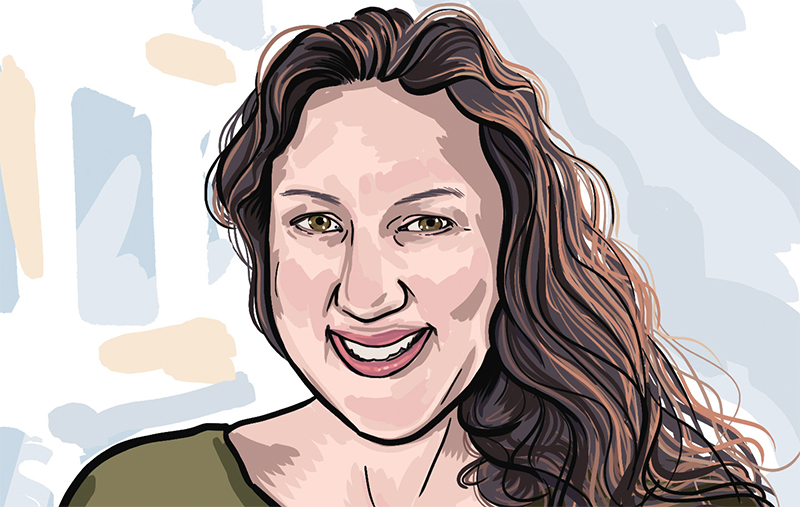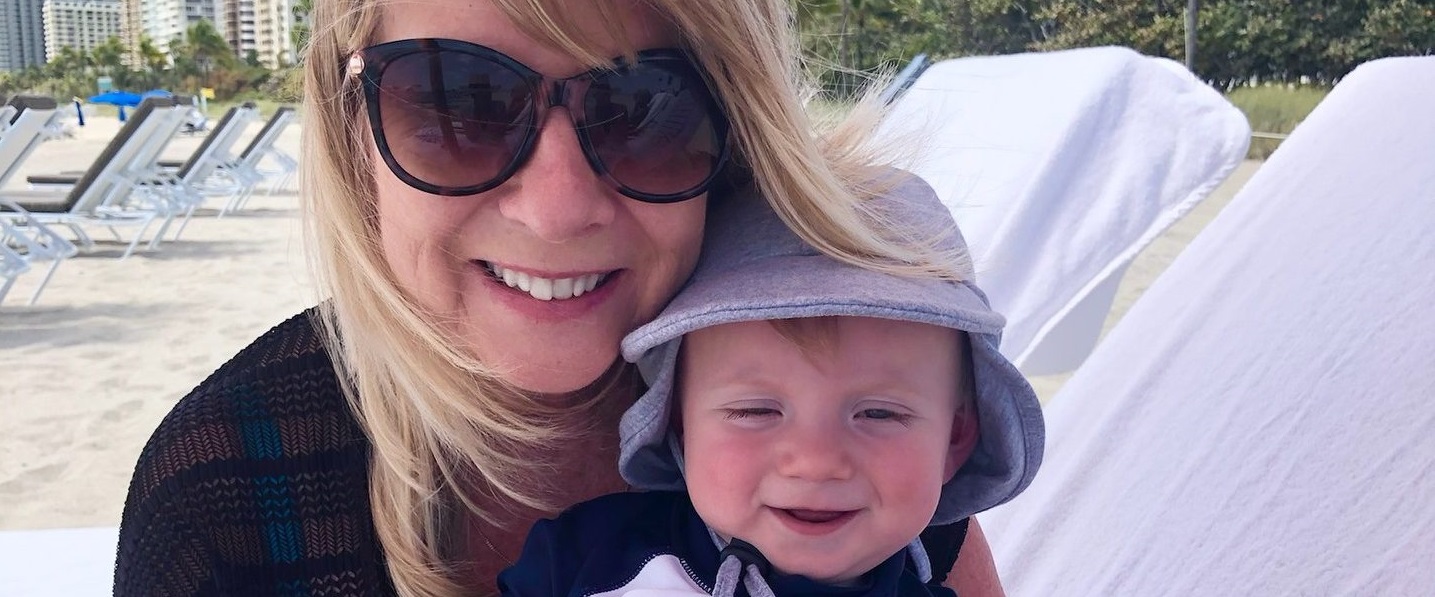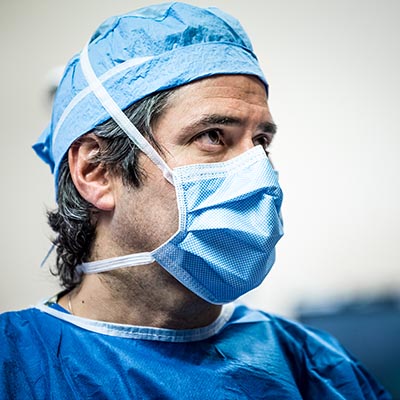

Typically, we photograph every patient appearing in HealthU. Because this story was planned during the surge of COVID-19, that contact would have been too risky. Instead, our team took a creative approach and replaced photo shoots with illustrated portraits of patients.
Cara Bayer had tried everything. The mother of two—to biological daughter Michaela, age 3, and step-daughter Alexis, age 10—spent most of her life plagued by horrible bleeding and uterine pain. The bleeding and pain worsened significantly after her pregnancy and was disrupting her life. “I would bleed like crazy,” Cara says. “It just wouldn’t stop, and it felt like I was always having my period.”
She tried one birth control pill, then another and another after that. She went through uterine scraping and had an ablation, a procedure that surgically destroys (ablates) the lining of the uterus. She even had a tubal ligation. “I bled for almost 12 weeks after that procedure,” she says. “Then I started getting my period every two weeks. That was pretty much the last straw.”
This was May 2020, during the height of the COVID-19 pandemic. The timing to try something new wasn’t ideal. But Cara couldn’t continue with the way things were. She called Craig Wiener, M.D., FACOG, OB/GYN at Pascack Valley Medical Center, whom she’d worked with for a few months, to discuss options. “I told him it was time for the next step: a hysterectomy,” she remembers. “He’s so busy—so many patients flock to him—and COVID-19 was going on. But he scheduled a telehealth appointment right away to talk through my options and what I could expect.”
A Minimally Invasive Solution
Cara and Dr. Wiener discussed the benefits of a robotic-assisted laparoscopic hysterectomy. With robotic-assisted laparoscopic surgery, the surgeon uses a computer to steadily and precisely control the surgical instruments. A robotic-assisted total laparoscopic hysterectomy is done by making five 8-millimeter incisions in the abdomen.
The surgery is minimally invasive, which means a quicker recovery and shorter hospital stay—especially valuable in the time of COVID-19. Women typically leave the hospital the same day and can be back to work or a normal routine in a week.
The upfront communication Dr. Wiener facilitated helped Cara feel confident about the choice. “He’s so positive and reassuring,” Cara says. “He knows these are tough decisions to make, and he wanted to make sure I felt good with my decision.”
That’s all part of practicing good medicine, Dr. Wiener says. “My practice’s philosophy is to transform women’s health care one patient at a time, combining positive bedside manner, conversations and communication with cutting-edge technology,” he adds. “To me, that’s how true medicine should be practiced.”
‘Spoke in the Wheel’
Because Cara’s surgery was scheduled in the middle of the COVID-19 outbreak, it was crucial to make sure she wasn’t COVID-19-positive before the procedure and that she didn’t get exposed to the virus during her stay.
Before surgery, Cara had a COVID-19 test, which was negative, and a chest X-ray. When the time came to check in, her husband, Michael, dropped her off at the front door. Inside, Dr. Wiener sat with Cara to go over everything once again. She had a second COVID-19 test, as well. “The team was so careful, safe and attentive. Dr. Wiener walked me through what would happen and let me ask any last-minute questions. I was going to be alone for surgery, but I completely trusted him and felt safe in his care,” she says.
Even when COVID-19 isn’t a concern, Dr. Wiener has a comprehensive and compassionate approach to his procedures. “I’m the last person they see when they go to sleep and the first person they see when they wake up,” he says. “I like to hold their hand and just make sure they feel safe, and I take that responsibility very seriously.”
Cara says that everyone on Dr. Wiener’s team helped her feel comfortable and confident. That teamwork is how it should be, Dr. Wiener says. “I’m really just one spoke in the wheel,” he adds. “My whole team has a role in making the patient’s experience incredible, and that is beyond valuable.”
In and Out
Cara’s surgery went off without a hitch, but it was her recovery that truly amazed her. “I was shocked,” she says. “I walked out that day, and I didn’t even need a wheelchair. My husband, Michael, was waiting for me outside and looking at me like, ‘Are you walking?’ He couldn’t believe it.”
That’s exactly what Dr. Wiener wants—and expects—from this minimally invasive surgery. To ensure that happens, he implements a scope of Enhanced Recovery After Surgery (ERAS) techniques before the procedure even happens. That includes helping patients establish a strong mind/body connection and using supplements to support healing and pain reduction. He also numbs the incision sites to avoid additional pain after surgery.
Dr. Wiener is also adamant about not contributing to the opioid crisis affecting this country. “Because of these ERAS techniques, I don’t have to prescribe opioids of any kind. At most, my patients take over-the-counter pain relievers.”
During Cara’s recovery, she took a single over-the-counter pain reliever. “I couldn’t believe how good I felt after surgery. My procedure was on Friday, and by Monday, I was walking outside and even went to the grocery store,” she says. “Dr. Wiener always said, ‘You’re going to do great. We’re going to get through this together, and I’m going to support you,’ And he really did. I’ll never forget him or my experience at Pascack Valley.”
Next Steps & Resources
- Meet your source: Craig Wiener, M.D., FACOG
- To make an appointment with Craig Wiener, M.D., FACOG or another provider, call 800-822-8905 or visit our website
Find a doctor near me
Weight-loss Surgery Leads to Unexpected Discovery for Seaside Heights Mother

Freehold Woman Finally Finds Pelvic Pain Relief
